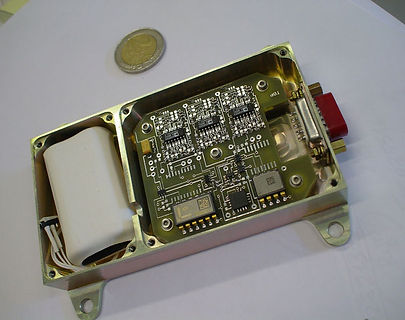STEM/SPACE PHYSICS SPACEFLIGHT KIT 2006-2008
PROJECT WITH NICK LARTER
PROJECT FOR ASTROCOURIER (IRELAND)
STEM/SPACE was the first of a series of
miniature space experiments to boost the
interest of students at schools and colleges
in space, to encourage them to take STEM
physics and mathematics courses and to
pursue careers in science and technology. About
the size of a portable telephone and weighing
about 200 grams, the STEM/SPACE experiment
was devoted to the study of g-forces during
spaceflight. It comprised two types of triple-axis accelerometer - one for macro-accelerations and
the other for micro-accelerations - and a memory
chip to record the accelerations in X, Y and Z axes
relative to the flight direction. The electronics were integrated into a robust alloy case. Batches of experiments would fly on roundtrip missions on the new generation of reusable launch vehicles that were under development at the time. After return to the ground, students would download the logged data on desktop computers and transform them into graphically drawn flight paths using equations and laws of motion as calculation tools. Schools would buy STEM/SPACE kits that included the experiment and the spaceflight. Funded by the European Space Agency, the STEM/SPACE prototype (photo top right) was tested in 2007 on ESA's FOTON-M3 mission (photo centre left) launched on a SOYUZ rocket (video right) and on the ESA/Novespace A-300 (photo top left) simulated microgravity aircraft.


